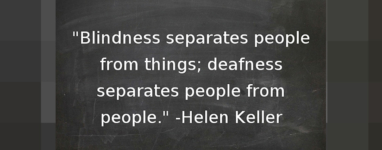FDA Finalizes Historic Rule For Over-the-Counter Hearing Aids
How to Be an Accessibility Advocate for Yourself (And Others) [Free Webinar]
On August 16, 2022, the U.S. Food and Drug Administration issued a final rule to improve access to hearing aids. The FDA’s action establishes a new category of over-the-counter (OTC) hearing aids, enabling consumers with mild to moderate hearing loss to purchase hearing aids directly from stores or online retailers without needing a medical exam, prescription, or fitting adjustment by an audiologist.
“As early as mid-October, Americans will be able to purchase more affordable hearing aids over the counter at pharmacies and stores across the country,” President Biden said. “This action makes good on my commitment to lower costs for American families, delivering nearly $3,000 in savings to American families for a pair of hearing aids and giving people more choices to improve their health and well-being.”
Learn how to be an advocate for people who are d/Deaf or hard of hearing ➡️
Restrictions: High Costs and Regulations
The National Institute on Deafness and Other Communication Disorders estimates that almost 30 million U.S. adults could benefit from hearing aids. However, not all U.S. adults who could benefit from hearing aids have used them:
- Only 1 in 4 U.S. adults ages 20 and over who could benefit from hearing aids has used them.
- About 1 in 6 adults (16%) ages 20 to 69 who could benefit from hearing aids has used them.
- About 1 in 3 adults (30%) ages 70+ who could benefit from hearing aids has used them.
An individual’s ability to manage hearing loss is influenced and affected by decisions and actions at many levels. The government must make institutional changes for consumers to access necessary services, technology, and support. Two main factors that limit consumers’ access to hearing devices are the high costs of the devices and strict regulations, which can increase costs by requiring specialized medical consultations.
High Costs
Despite a high number of Americans touched by hearing loss, many have never used hearing aids primarily because of the high cost. Medicare and most private insurance plans do not cover hearing aids, and out-of-pocket costs for two hearing aids can cost $5,000 or more—far out of reach for many consumers.
White House National Economic Council director Brian Deese said the government estimated the new rule will save consumers about $2,800 per pair of hearing aids and could help “tens of millions of Americans.”
FDA Regulations on Hearing Aids
In addition to the high cost of hearing aids, in 1977, the Food and Drug Administration (FDA) imposed special regulations on hearing aids. These regulations required that individuals obtain a medical evaluation or sign a waiver of that evaluation before being allowed to purchase or use a hearing aid. The National Academies of Sciences, Engineering, and Medicine have extensively reviewed this policy and found “no evidence that the required medical evaluation or waiver of that evaluation provides any clinically meaningful benefit.” Thus, they recommended removing this restrictive regulation and recommended, along with the President’s Council of Advisors on Science and Technology (PCAST), that some types of hearing aids be made available over the counter.
Learn how to be an accessibility advocate for yourself and others ➡️
Over-the-Counter Hearing Aids: A Long Time Coming
Over-the-counter hearing aids have been in the works for years. In 2015, the President’s Council of Advisors on Science and Technology under Barack Obama recommended that the FDA create a new category of “basic” hearing aids that could be purchased without a prescription or a doctor’s visit. In 2017, the Over-the-Counter Hearing Aid Act was introduced in the Senate by Elizabeth Warren (D-MA) and Chuck Grassley (R-IA) but implementation was slow and the FDA missed the 2020 deadline.
In June 2021, President Joe Biden issued an Executive Order on Promoting Competition in the American Economy, calling for the FDA to take steps to allow hearing aids to be sold over the counter, which would increase competition, spur innovation, and lower prices. The new final rule is the last step in the process, and hearing aids could be available in drug stores and online as early as October 2022.
Hearing Loss Association of America Executive Director Barbara Kelley noted in a press release, “We are hopeful that over-the-counter options will inspire some to take a first step to treat their hearing loss sooner. Ultimately this can mean a better quality of life, and avoiding the increased risk of dementia, falls and isolation associated with untreated hearing loss.”
However, Kelley and some audiologists have cautioned that there is no one-size-fits-all approach to hearing loss. For many, a hearing care professional should still be a part of an effective treatment plan.
This blog was originally published by Elisa Lewis on August 10, 2017, and has since been updated for comprehensiveness, clarity, and accuracy.
Further Reading

Subscribe to the Blog Digest
Sign up to receive our blog digest and other information on this topic. You can unsubscribe anytime.
By subscribing you agree to our privacy policy.






